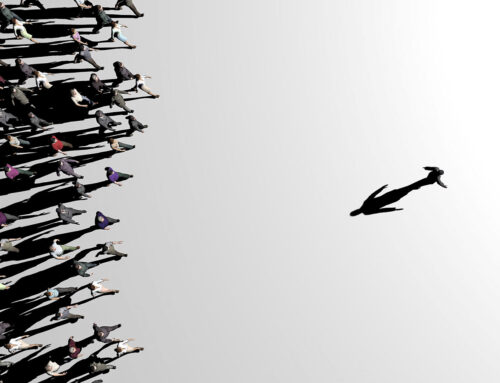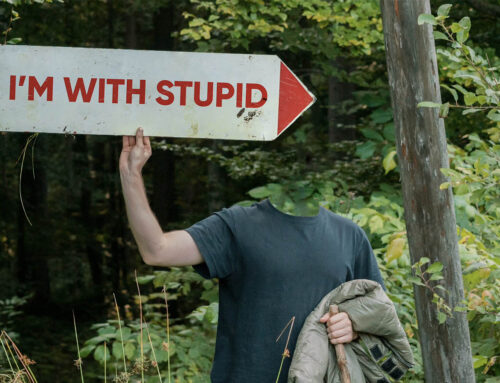Can You Handle YOUR Truth?
In one of the more memorable scenes from the hit film, A Few Good Men, a prosecuting attorney is blasted by a senior Marine Corps officer for being unable to handle the truth that hard-nosed men like him are necessary to secure the nation’s peace in volatile regions like Guantanamo Bay, Cuba.
The line – “You can’t handle the truth!” – would become a mainstay of popular lore, and today it is routinely trotted out to deride those said to be in denial of some unpleasant truth (politicians and spouses being especially adept at its use).
To know thyself is the beginning of wisdom. – Aristotle
Of all of life’s uncomfortable truths, however, it could be argued that one stands out above all others: the idea we don’t really know ourselves, or at least not nearly as well as we imagine we do.
And why wouldn’t such a suggestion sting? After all, ‘I’ am the thing that is forever with me. How the heck could I not know myself intimately well and certainly better than those around me (alas, research confirms others often know us better than we know ourselves).
This also happens to be the one piece of human denial that matters most. Because absent an authentic and honest understanding of ourselves, how can we possibly hope to achieve our life’s goals?
Think about it: because life really is about the journey (again, toward goals such as happiness, career success, meaning, and so on), we invest enormous sums of time, money, and effort on external efforts that are expected to help us achieve those goals. We could think of these as the maps, compasses, and other devices necessary for these journeys. But if the one taking that journey is him/herself lost, then the journey itself very likely is a mistake (translation: you’re marching toward a goal that may not actually be of real value to you).
This helps to explain why young people routinely change their academic majors again and again; why so many of us hop from job to job; and why we so often marry the wrong spouse.
Know Thyself
Inscribed in the frontispiece of the ancient Greek Temple of Delphi are the words, ‘Know thyself.’ Those two words, later championed by Socrates, Plato, Shakespeare and innumerable other philosophers, artists, psychologists, self-help gurus, and spiritual sages, suggest that only when we truly know ourselves is life made meaningful, understandable, and ultimately worthwhile.
In fact, when asked to consolidate the whole of his teachings into a single lesson, Socrates simply repeated the words, “know yourself.”
The most difficult thing in life is to know yourself. – Thales of Miletus
Missing from that statement was how one should go about accomplishing that feat. Indeed, centuries later another great mind – that of Benjamin Franklin – would liken knowing oneself to being as ‘hard’ a subject as steel or diamonds.
Fortunately, that particular hurdle has been reduced courtesy of advances in modern psychology and behavioral science.
Getting to Know Yourself
One way to know yourself is just to ‘look inside’ yourself. If you put your mind to it, just decide who you want to be. And poof. “I’m good enough. I’m smart enough. And doggone it, people like me.” It sort of worked for Stuart Smalley, but for most of us, that’s delusional.
Another way to get to know yourself is to look at how others experience you. What’s your brand? Have you listened to what other’s have said? “You are such a caring person!” and “You are so calm under pressure!” But is that just coming from mom? It could be a little biased.
What do your friends say about you? “You’re so smart! Wicked smart.” or “You can fix anything. Such a great problem solver.”
But what’s the best way to know yourself?
Accurate data.
For example, what if you’re 5’9” and think you’re tall, are you right? Well, if you are a man in North America, you’re below average (47th percentile). But if you’re a woman, you’re right (97th percentile).
The tools developed by InsightFull are based on science. We’ve got the data. We’ll help you see yourself through a variety of means, self-scored tools that have proven scientific validity, and feedback from those who know you best.
You can handle the truth. And remember — it’s a journey, and we’ll be there with you. We might even nudge you a few times to look up and appreciate the view, since that IS the destination.
Can You Handle YOUR Truth?
In one of the more memorable scenes from the hit film, A Few Good Men, a prosecuting attorney is blasted by a senior Marine Corps officer for being unable to handle the truth that hard-nosed men like him are necessary to secure the nation’s peace in volatile regions like Guantanamo Bay, Cuba.
The line – “You can’t handle the truth!” – would become a mainstay of popular lore, and today it is routinely trotted out to deride those said to be in denial of some unpleasant truth (politicians and spouses being especially adept at its use).
To know thyself is the beginning of wisdom. – Aristotle
Of all of life’s uncomfortable truths, however, it could be argued that one stands out above all others: the idea we don’t really know ourselves, or at least not nearly as well as we imagine we do.
And why wouldn’t such a suggestion sting? After all, ‘I’ am the thing that is forever with me. How the heck could I not know myself intimately well and certainly better than those around me (alas, research confirms others often know us better than we know ourselves).
This also happens to be the one piece of human denial that matters most. Because absent an authentic and honest understanding of ourselves, how can we possibly hope to achieve our life’s goals?
Think about it: because life really is about the journey (again, toward goals such as happiness, career success, meaning, and so on), we invest enormous sums of time, money, and effort on external efforts that are expected to help us achieve those goals. We could think of these as the maps, compasses, and other devices necessary for these journeys. But if the one taking that journey is him/herself lost, then the journey itself very likely is a mistake (translation: you’re marching toward a goal that may not actually be of real value to you).
This helps to explain why young people routinely change their academic majors again and again; why so many of us hop from job to job; and why we so often marry the wrong spouse.
Know Thyself
Inscribed in the frontispiece of the ancient Greek Temple of Delphi are the words, ‘Know thyself.’ Those two words, later championed by Socrates, Plato, Shakespeare and innumerable other philosophers, artists, psychologists, self-help gurus, and spiritual sages, suggest that only when we truly know ourselves is life made meaningful, understandable, and ultimately worthwhile.
In fact, when asked to consolidate the whole of his teachings into a single lesson, Socrates simply repeated the words, “know yourself.”
The most difficult thing in life is to know yourself. – Thales of Miletus
Missing from that statement was how one should go about accomplishing that feat. Indeed, centuries later another great mind – that of Benjamin Franklin – would liken knowing oneself to being as ‘hard’ a subject as steel or diamonds.
Fortunately, that particular hurdle has been reduced courtesy of advances in modern psychology and behavioral science.
Getting to Know Yourself
One way to know yourself is just to ‘look inside’ yourself. If you put your mind to it, just decide who you want to be. And poof. “I’m good enough. I’m smart enough. And doggone it, people like me.” It sort of worked for Stuart Smalley, but for most of us, that’s delusional.
Another way to get to know yourself is to look at how others experience you. What’s your brand? Have you listened to what other’s have said? “You are such a caring person!” and “You are so calm under pressure!” But is that just coming from mom? It could be a little biased.
What do your friends say about you? “You’re so smart! Wicked smart.” or “You can fix anything. Such a great problem solver.”
But what’s the best way to know yourself?
Accurate data.
For example, what if you’re 5’9” and think you’re tall, are you right? Well, if you are a man in North America, you’re below average (47th percentile). But if you’re a woman, you’re right (97th percentile).
The tools developed by InsightFull are based on science. We’ve got the data. We’ll help you see yourself through a variety of means, self-scored tools that have proven scientific validity, and feedback from those who know you best.
You can handle the truth. And remember — it’s a journey, and we’ll be there with you. We might even nudge you a few times to look up and appreciate the view, since that IS the destination.



